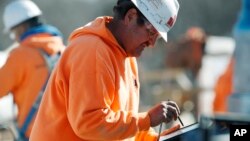The U.N. labor agency says existing methods of protecting workers from accidents and disease are not good enough to deal with new occupational hazards arising from changes in the nature of work. The International Labor Organization (ILO) is calling for revisions to address physical and psychological problems stemming from the changing job world.
In a new report, ILO estimates find 2.78 million workers die from occupational accidents and work-related diseases each year. It says more than 374 million people are injured or fall ill every year through work-related accidents. The cost to the world economy from work days lost is nearly four percent of global Gross Domestic Product.
The ILO's report warns the changes and dangers posed by an increase in technology could result in a worsening of that situation. It says new measures must be implemented to deal with the psycho-social risks, work-related stress and non-communicable diseases resulting from new forms of work.
It says digitization, artificial intelligence, robotics and automatization require new monitoring methods to protect workers.
Manal Azzi, an ILO Technical Specialist on Occupational Safety and Health, says that on the one hand, new technology is freeing workers from many dirty, dangerous jobs. On the other, she says, the jobs can raise ethical concerns.
She told VOA surveillance of workers has become more intrusive, leading them to work longer hours, a situation that may not be ethical.
“Also, different monitoring systems that workers wear. Before, you would punch in, punch out. Now, you could wear bands on your wrist that show how many hours you are actually working in a production line. And, there is even discussion of introducing implants, where workers can be continuously surveyed on their production processes,” she said.
Azzi said a host of mental problems could be introduced by new work environments. The report also focuses on changes in demographics. It says employers have to adapt to the physical needs of older workers, who may need training to safely operate equipment.
Another area of concern is climate change. The ILO is positive about the green jobs being introduced. But it says care must be taken to protect people from warmer temperatures that increase risks, including air pollution, heat stress, and newly emerging diseases.
In the past, creating a safer working environment focused on the prevention of risks. Authors of the report say the ILO today needs to anticipate the risks. They say new skills and information about safety and health in the workplace have to be learned at an earlier age. Before young people apply for a job, they say, they should know their rights. The power of knowledge, they say, will help protect employees in the workplace.





